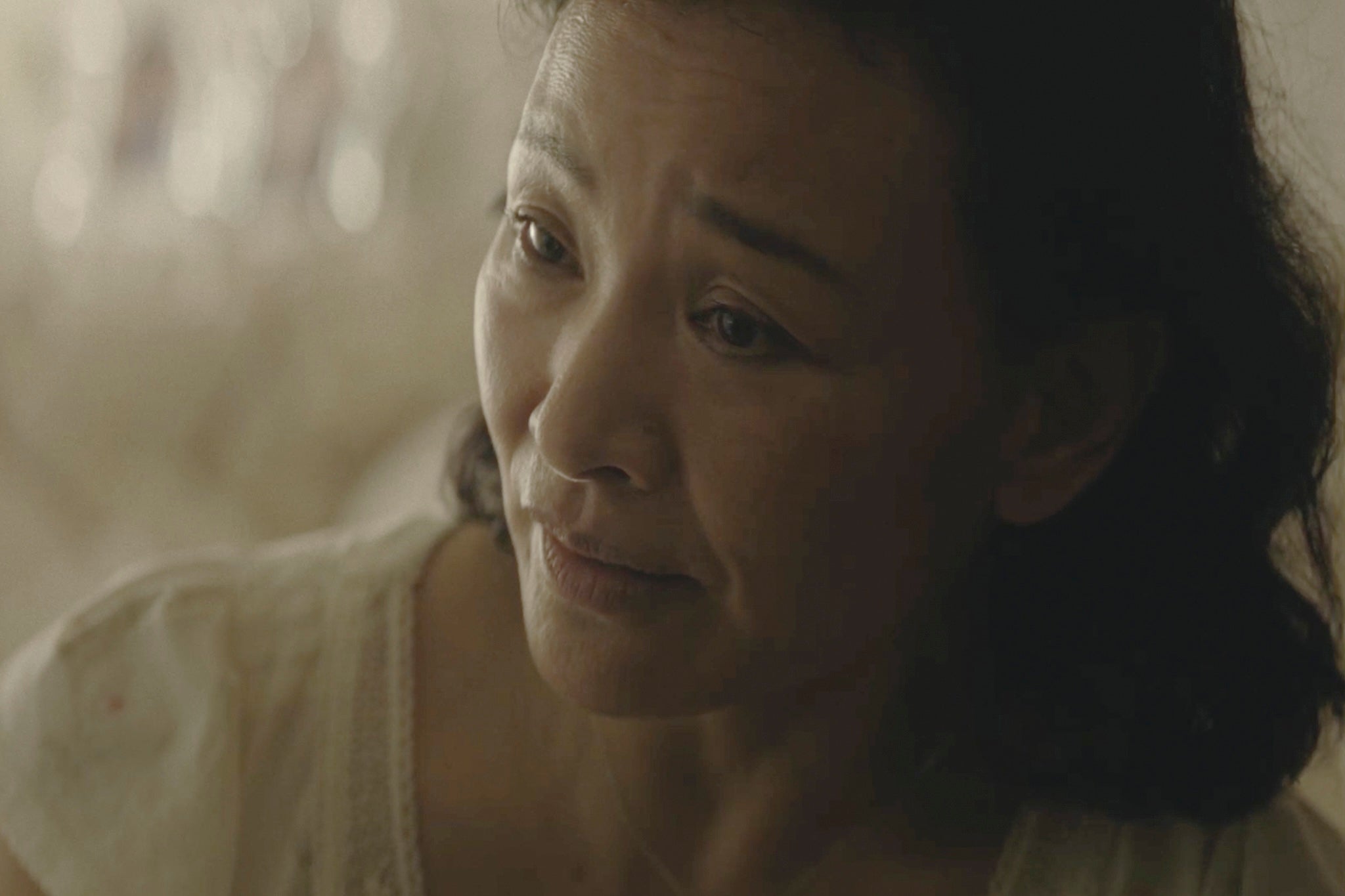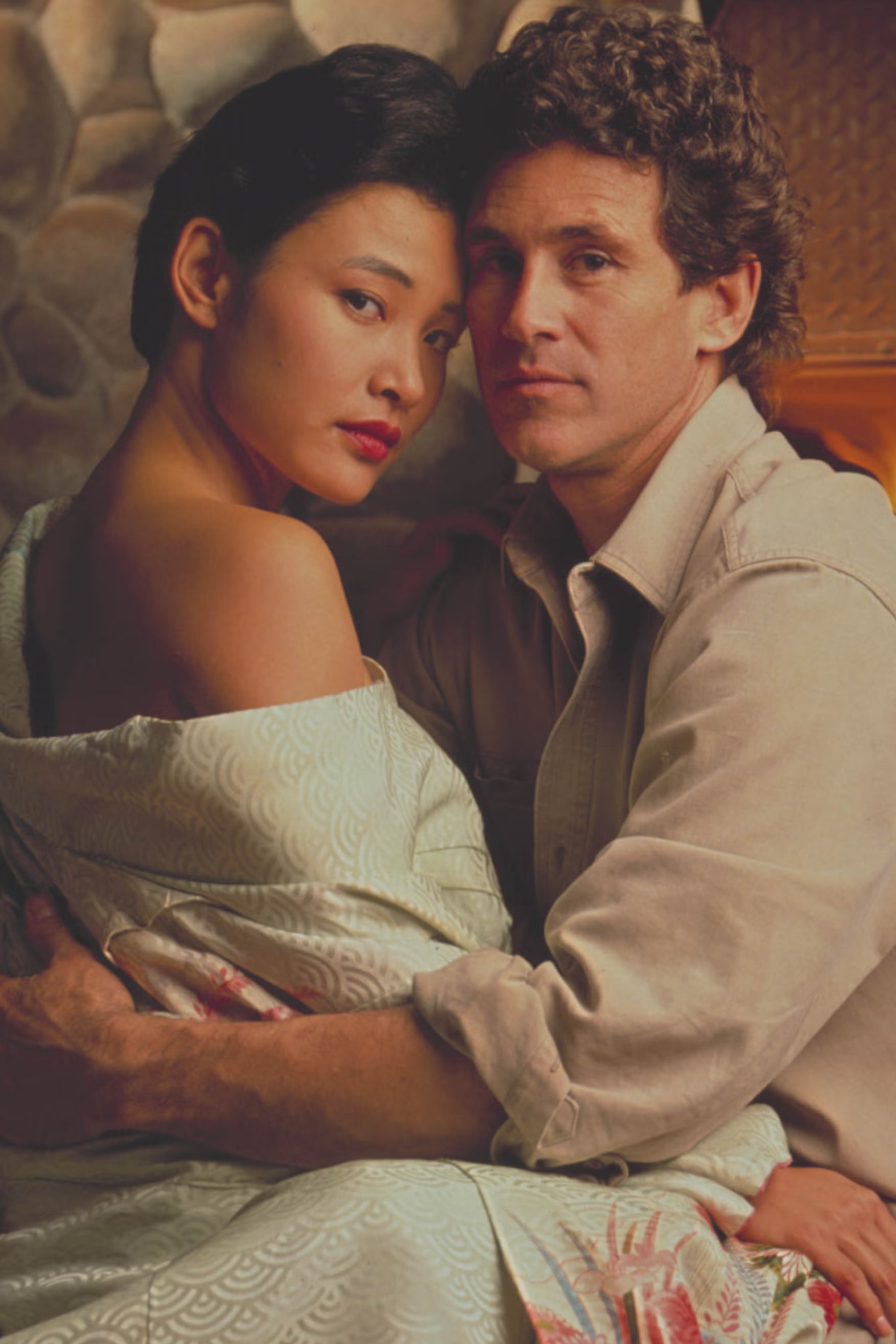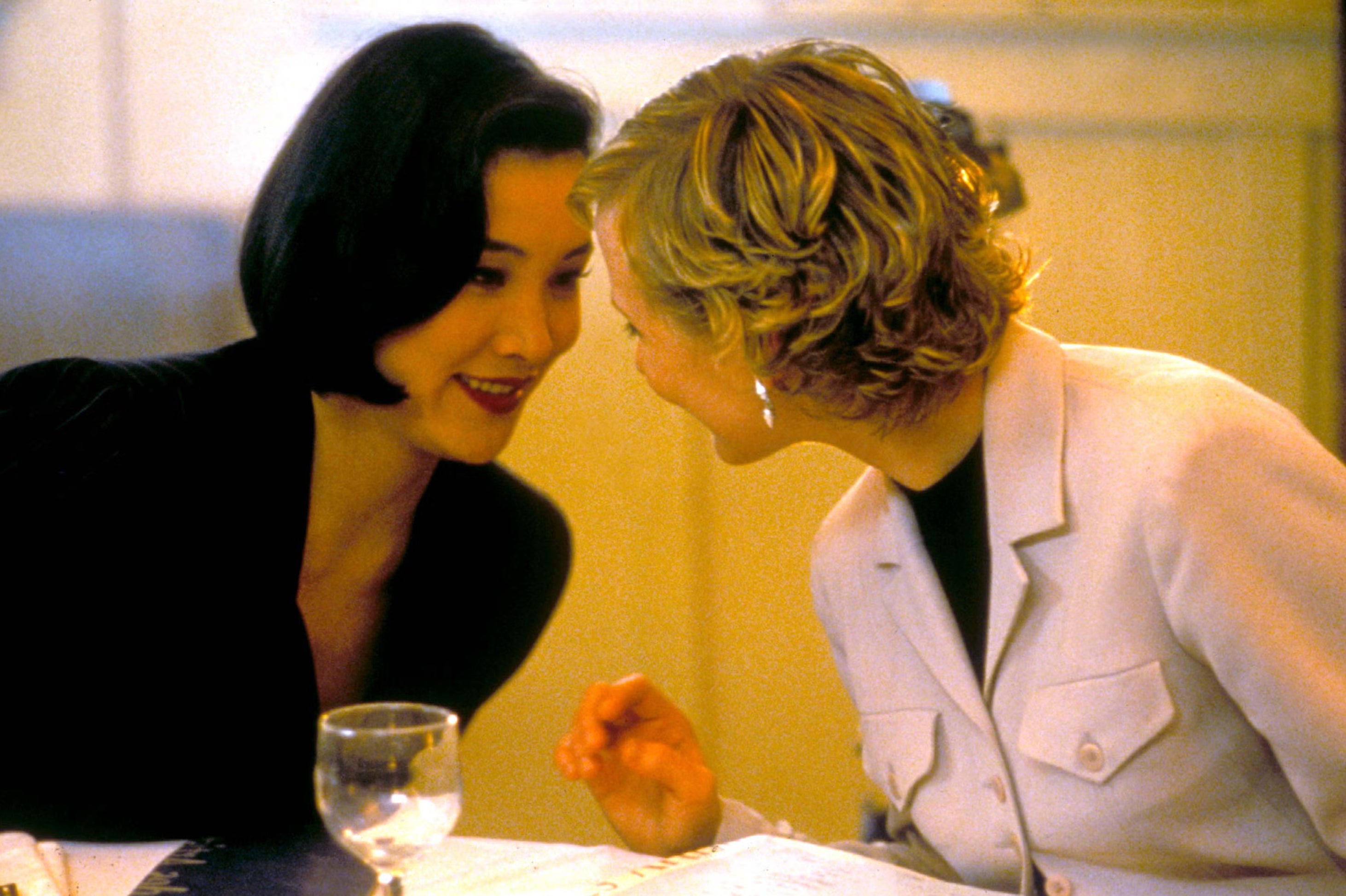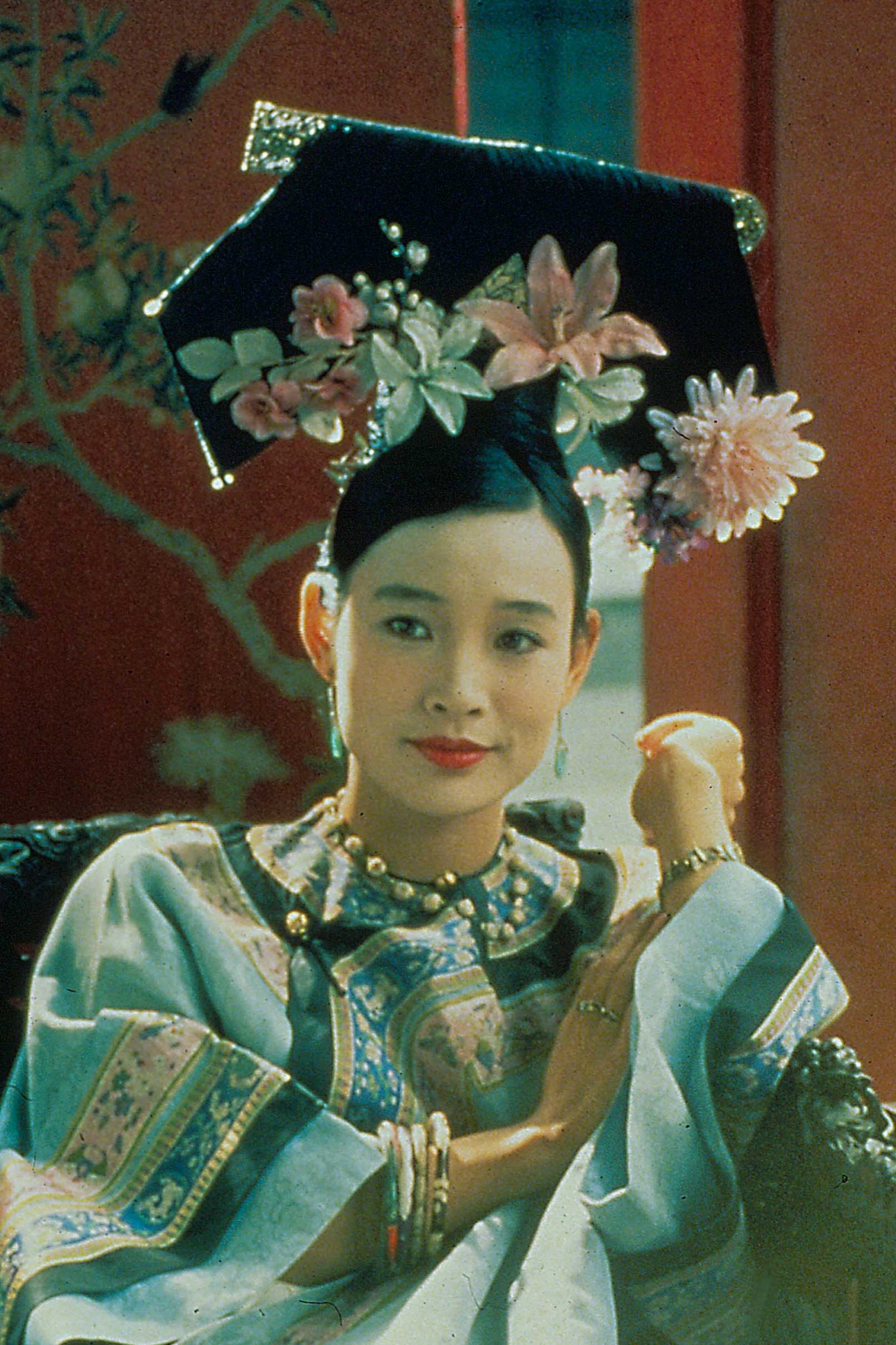It’s been 33 years since Joan Chen was turned into a doorknob. In 1991, having asked David Lynch to write her out of his surrealist soap opera Twin Peaks, the actor found her character, factory owner Josie Packard, doomed to a life in timber: her soul trapped within the handle of an oak wood nightstand. “I don’t think anyone else has ever become a doorknob,” Chen laughs – not from inside a doorknob, mind you, but over Zoom.
That the scene rings so strange even for Lynch, a director famed for strangeness, is a testament to its singularity. Who else but Chen, now 63, can lay claim to the same bizarre fate? That same singularity has come to define the actor-director’s near 50-year career. It began in Shanghai, when she was plucked aged 14 from her school rifle range by Mao Zedong’s wife for her excellent marksmanship. Only five years later, at 19, she won China’s equivalent of the Best Actress Oscar before she moved stateside.
Of course, singularity is often a byproduct when you’re the first to do something – which, being a Chinese woman entering Hollywood in the 1980s, Chen often was. But in the US, she has flown mostly under the radar, popping her head above the parapet every so often to direct an MGM-backed romantic drama with Richard Gere and Winona Ryder (2000’s Autumn in New York) or star in a nine-time Oscar-winning film herself (Bernardo Bertolucci’s historical epic The Last Emperor) – all the while, working consistently back home in China and navigating the meagre, and often unsavoury, selection of parts available to her as an Asian actor in America.
Films like her latest, Dìdi, were certainly not in abundance. Even today, they’re rare. In the same vein as Bo Burnham’s Eighth Grade, Dìdi is Sean Wang’s semi-autobiographical tale about a Taiwanese American boy coming of age in the Californian suburbs. Chen plays his mother. The film hits a deep vein for Chen, who raised her own two children around the same time as the film is set, in 2008. “There is that cultural chasm,” she says. “I’d drive my kids and their friends to school, and what they were saying sounded almost foreign to me as a Chinese mother having American children.”
Her performance is minimalist and moving, so much so that it’s generating early Oscar buzz. It was refreshing, says Chen, to read a script for an Asian mother who is not the stereotypical tiger mum, but strong all the same. “Making this felt redemptive for me,” says Chen. “I was a nervous, fearful mother and I made a lot of decisions based on fear, while Sean’s mom has a stronger forbearance. So, to be able to experience motherhood again vicariously through the role was very emotional.” One of her daughters even came home from college to serve as a PA on set. “It was healing for me and my kids,” she says.
All this to say, Dìdi is a film Chen knew she wanted to be a part of. Not always has she been so certain about past roles. Still, today, she is dismayed at her younger self for quitting Lynch’s creepy cult classic Twin Peaks. “I was so determined that I wanted to do feature films more than television,” she scoffs. “I wanted the gravitas of being this great dramatic actress.”

It stung that much more given the film she left to do – 1992’s Turtle Beach, a drama about Vietnamese refugees – was broadly panned. “Some of the decisions I made were wrong,” she says, frankly. Was Lynch understanding of her choice to quit? “Well, I don’t think anybody would be happy that their actor wants to be written out,” says Chen, but she has made peace with her past. “At this time in my life, I do feel like you fall into your destiny. There are always choices you wish you made differently. That’s life.”
Chen moves through our conversation, and one suspects life, with a certain serenity – a c’est la vie-ness that is palpable and enviable. Asked how she feels about getting older in an industry notoriously awful to older women, she is empathetic to casting agents obsessed with youth. “I don’t blame people for wanting to see young and beautiful people on screen, because that’s so short,” she says. “It’s so precious, like a flower that blooms only for one season, and so I understand.” (Chen is, by the way and by all accounts, completely striking.)
“At the same time, as I mature myself, I know I am more interesting,” she says. “I have more layers to me than when I was in my twenties or thirties, the creative juices are still flowing and there are things that I can give on screen that are worth people’s time.” Chen is then, to borrow her metaphor, blooming for a second season, and with any luck several more after that.

Watch Apple TV+ free for 7 days
New subscribers only. £8.99/mo. after free trial. Plan auto-renews until cancelled

Watch Apple TV+ free for 7 days
New subscribers only. £8.99/mo. after free trial. Plan auto-renews until cancelled
Raised in Shanghai during the Cultural Revolution of the Sixties and Seventies, Chen was due to be exiled from the city as part of Mao’s Down to the Countryside movement – a policy that saw millions of urban youths forcibly relocated to the countryside for “re-education”. It was a fate she narrowly escaped when selected to join the Shanghai Film Studio instead. Fame followed, accelerated by an award-winning turn as an abandoned teenager in the romantic war epic Little Flower.
“I was too young to be grateful,” says Chen of the award, which she won at 19. “I hadn’t gone through any hardship to actually reach there.” But hardship was around the corner; superstardom did not suit her at all. “I hadn’t changed overnight, but somehow everyone was seeing me differently,” she says. “I never trusted that adoration, never made friends with it.” And so, she left for America: a place where she could be nobody once again.

In fact, Chen hadn’t expected to continue acting in the US. She studied film at California State University while working in a Chinese restaurant “to make ends meet”. It was only when her classmate, a stuntwoman a few years older, told Chen that Hollywood pays better than the service industry that she gave it another go. She took a two-hour bus ride to Bessie Lou, the actor’s agency, she was told, that “represented all Asians”.
Chen arrived with no appointment, no headshot, and a half-baked CV. “I didn’t even know how to make a resume,” she says. “Headshot? What headshot?” When the agent showed her examples, not a single one looked like her. “All the females were very Anna May Wong,” she says, referencing the blunt fringe and vaulted eyebrows of the Forties Hollywood icon. “Guy [Lee, the agent] looked at me funny. He didn’t think I was Chinese enough.” Then, she laughs, “When he saw Best Actress on my CV, he thought I was crazy.”
Chen’s first few roles were predictably horrible. “My second part ever was a dead prostitute lying on the floor.” The director asked Chen if she would mind going nude for the role. She did. Her first Hollywood film was Tai-Pan, a role she got because the casting agent saw her out the window of his Lincoln. It’s funny how things happen in the business, is her point. “This is not a profession where hard work and results match up. They don’t correlate at all.”
By then I had made some other… forgettable works. But I remember Bertolucci saying, ‘Oh, the years have been kind to you. You’re still pretty.’
Tai-Pan ended up being a misstep in itself. “I got Karate Kid at the same time, so I had to make a decision, and I chose Tai-Pan – wrongly!” she laughs. As well as a flop, Tai-Pan was criticised for peddling stereotypes of Asian people. Chen’s CV, like that of any Asian woman acting at that time, is rife with dragon ladies and sexy concubines. Asked how she reflects on those parts now, Chen sighs with a degree of resignation: “They’re jobs.” They helped keep her tools sharp for whenever the right thing did come along – whenever that would be.
In 1995, she had another shot at Hollywood fame, starring opposite Anne Heche as lesbian femme fatales in the erotic thriller Wild Side. The film had a notoriously troubled production and would later be cut to pieces by its backers, with director Donald Cammell dying by suicide after he learnt he would not receive final cut. The explicit sex scenes between Heche and Chen caused a stir, too, with even HBO choosing to broadcast an edited version.
I wonder if the film’s production brought the team closer together on set. “Did we all get close?” Chen repeats after me, her eyebrows knitted together in confusion. “No, I don’t think so. Anne wasn’t happy anymore, and she was a little troubled after a while.” Chen had her own worries weighing heavy on her mind. “I actually lost a pregnancy during the filming,” she reveals. “I went in pregnant, and then during the shooting lost it. I was very much wrapped up in my own tragedy.”

She did, though, enjoy the challenge of playing her first lesbian relationship. “In that sense, [Anne] and I were very close because we wanted to protect one another and we wanted to make each other look the best we could,” Chen says. “And so, on those days, we were very, very close.” Given the absence of intimacy coordinators, a staple on sets today, did they feel safe? “I think Anne wasn’t feeling all that safe with the director, but we did our best to make each other feel safe.” (Heche, who died in 2022, wrote in her posthumous memoir that Cammell had sexually harassed her on set, and that it was the chance to work with Chen and their co-star Christopher Walken that convinced her not to quit the film.)
In Chen’s mind, one role stands out from the rest: her part as Wanrong, wife and empress consort of Puyi, the last emperor of China, in Bertolucci’s epic. “That was the process that made me love filmmaking itself,” says Chen. The movie swept the Oscars, taking home all nine of its nominations. Notably, there was not a single nod for its actors. “It was a different time,” Chen offers by way of explanation. “If it came out today, I think it would be different. But back then… it was just the era – nobody conceived of Asian people getting Oscars, not actors.” You get the sense Chen holds no grudges.
“Bernardo went up on stage a couple times to accept the Oscars, and you know, there is such a long list of people to thank but when he went up, he said, ‘I want to thank the Chinese people, my emperor and my empress: John [Lone] and Joan [Chen]’ and that was all,” she recalls. “I felt that was all I needed, to have my director know my worth.”

Bertolucci is not without controversy. In 2016, an old interview emerged of the late director stating that he and actor Marlon Brando had conspired to shoot the infamous rape scene of his 1972 film Last Tango in Paris, in which Brando’s character uses a stick of butter to rape his lover, without the full consent of 19-year-old star Maria Schneider – who in 2007 said she felt humiliated and “a little raped” by the surprise introduction of the butter in the scene.
Chen pauses a moment when the topic is broached. Did that change how she felt about Bertolucci? “No,” she says eventually. “No. Not at all, because I know him as a human being.”
Here, she recalls a fond memory: the first time she saw Bertolucci after the Oscars. He had come to the London premiere of her film Judge Dredd, a critical miss co-starring Sylvester Stallone. “By then I had made some other… forgettable works,” she says, half-laughing. “But I remember him saying, ‘Oh, the years have been kind to you. You’re still pretty.’ No mention of Judge Dredd. We just looked at each other and, even though he had made good films after The Last Emperor, we both knew that was his peak. And he knew it was my peak.”
She smiles, the picture of serenity.
“It was almost like we were saying, we’ll always have the Forbidden City.”
‘Dìdi’ is in cinemas from 2 August

